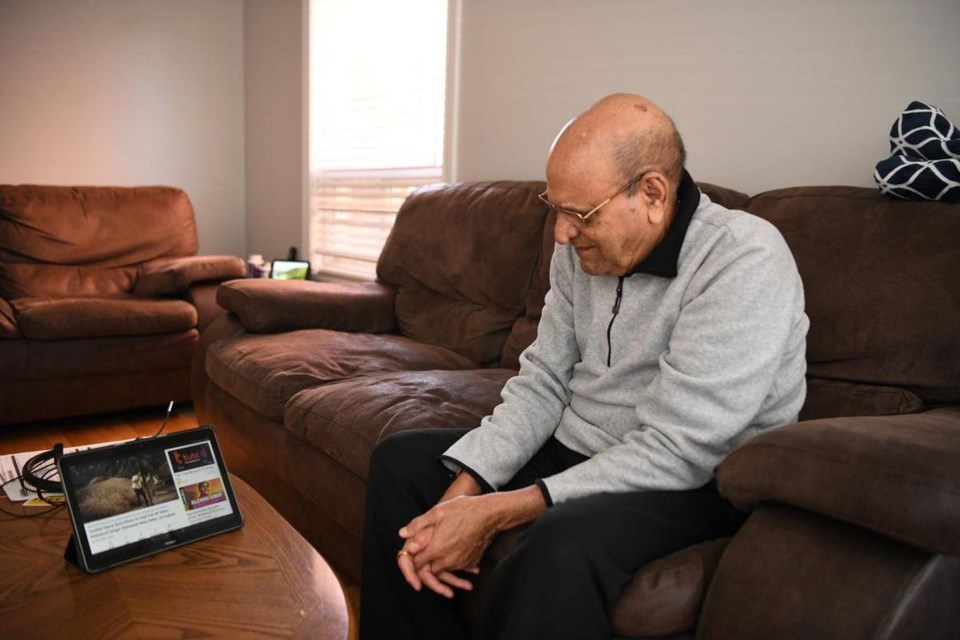“And now we’ll move into modified pigeon pose,” an instructor calls over Zoom as dozens of seniors pull their foot to their thigh for a hip stretch from their living rooms and bedrooms.
This Thursday fitness class for seniors has run for years, and to keep it going during the pandemic, its members learned some new tech skills with the help of Human Endeavour.
Many seniors have been members of the Vaughan-based organization that supports newcomers since it was founded in 2005. A few participants said they attend the exercise, dance and music classes weekly, if not several times a week.
“We knew that we can’t let these seniors disconnect themselves from the groups where they have friends and affiliations,” he said.
When the pandemic hit in March 2020, founder Noor Din thought of a way to continue the scheduled seniors programming that is usually a highlight of many of their days.
Within a month, Human Endeavour provided tablets for its community members so that classes could carry on virtually. And in the process, bridged a technology gap for hundreds of seniors in the GTA.
“Some of our seniors say, oh, we get ready in the morning as if we are going to a community centre, even though (the) program is online,” Din said.
The system Human Endeavour created is ripe for expansion, and could be a way to make tech more accessible to seniors — especially newcomers with language barriers.
With a background in engineering, Din got ahead of some user challenges that could be overlooked. The team made the tablets “senior friendly”: large font, the applications were stripped to the basics — email, Zoom and an internet browser, with an option to add more — and loaded software so they could help with remote assistance.
If there were seniors who did not have a Wi-Fi connection, the team provided tablets with 10 to 12 gigabytes of data per month. After joining classes, there’s still about four to five gigabytes left for the members to play with.
And on top of that, Human Endeavor created a multilingual helpline, so that seniors could call someone and get help in English, Tamil, Hindi, Urdu, Punjabi, Cantonese and Mandarin. The helpline number is handy, taped on the back of the device.
“There are seniors who don’t even speak a single word of English and they have learned how to operate this tablet,” Din said. “Our seniors have taken technology as an essential part of their future.”
During the pandemic, with in-person services, schools and more shuttered and moved online, the challenges for Ontarians accessing the internet gained more notice and concern.
And it became more pronounced for seniors, especially with booking appointments for COVID-19 vaccinations online. Children and grandchildren have been helping them navigate the system and at Human Endeavour, Din says the team booked appointments on behalf of their members.
With new funding from the United Way’s Allan Slaight Seniors Fund — just under $1 million over the next five years — Din said the program can expand, since they’ve already created a base and model. Right now, eight staffers work to run the helpline and tablet distribution.
With a well-oiled and effective system, Din has extended the resources to at least 20 other partner organizations around Ontario, which use the senior-friendly tablets and call centre. So far the team has distributed more than 400 devices.
Human Endeavour is one of about 10 programs that received funding from the United Way through the Slaight Family funding dedicated to combating senior loneliness.
“Many seniors actually have social networks. They rely on people and programs that … keep them connected,” said Ruth Crammond, vice-president of investment and development at the United Way. “During the pandemic, many of those things were cut off from them.”
With technology becoming a more important way for seniors to socialize and access services, Crammond said a number of programs the United Way supports have been coming up with ways to bridge the digital divide.
“I think we make an assumption that they’re not going to be able to use technology,” Crammond said. “But there are a number of seniors that are able to pick it up, especially if it’s presented in the right way, and in an accessible way that meets their needs.”
Angelyn Francis is a federally funded Local Journalism Initiative reporter at the Toronto Star.



